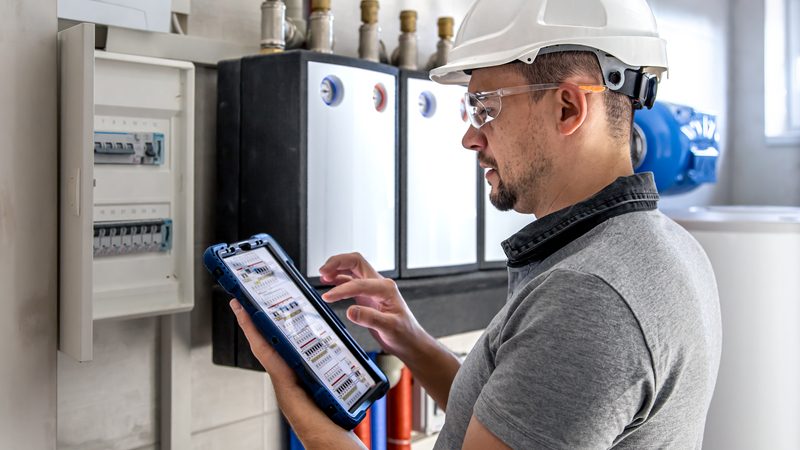Energy-efficient HVAC maintenance refers to the regular care, inspection, and optimization of heating, ventilation, and air conditioning systems to reduce energy consumption while maintaining indoor comfort. It’s a proactive approach designed to ensure your HVAC system operates at its best—using less electricity, improving performance, and extending its lifespan.
Unlike standard servicing, energy-efficient maintenance focuses on fine-tuning every system component—from filters and coils to refrigerant levels and thermostat calibration. The goal is to make your HVAC system smarter, greener, and more cost-effective over time.
1. Why Energy Efficiency Matters
Energy efficiency isn’t just about saving money—it’s about sustainability, comfort, and responsibility. Research shows that an optimized HVAC system can lower utility bills by up to 30%, reduce greenhouse gas emissions, and improve overall indoor air quality.
For homeowners, that means long-term savings and consistent comfort year-round. For businesses, it translates into reduced operating costs and compliance with modern energy standards. In short, maintaining an energy-efficient HVAC system benefits your wallet, your health, and the planet.
2. Understanding How HVAC Systems Consume Energy
Key Components That Affect Efficiency
To make your HVAC system more efficient, it’s crucial to understand how energy is consumed. Several components directly influence performance and energy use:
-
Compressor:
Known as the heart of your HVAC system, the compressor circulates refrigerant throughout the system. When it’s not properly maintained, it consumes excessive electricity, driving up energy costs. -
Fans and Motors:
These circulate air through ducts and vents. Dirty or under-lubricated fan motors have to work harder, consuming more power. -
Thermostats and Controls:
An outdated or poorly calibrated thermostat can cause frequent cycling, leading to unnecessary energy waste. Upgrading to a programmable or smart thermostat can significantly reduce power usage.
Common Causes of Energy Waste
Even a small maintenance oversight can cause a ripple effect on efficiency. The most common culprits include:
-
Clogged filters and dirty coils that restrict airflow.
-
Leaky ducts that allow conditioned air to escape.
-
Poor insulation that forces the system to overcompensate.
-
Infrequent maintenance leads to worn-out components and inefficiencies.
Addressing these issues early can save both energy and expensive future repairs.
3. Essential HVAC Maintenance Tasks for Energy Efficiency
1. Regular Filter Replacement
Replacing filters is the simplest yet most impactful HVAC maintenance task. Dirty filters restrict airflow, forcing your system to run longer and use more energy. Experts recommend replacing them every 1–3 months, depending on usage and air quality.
2. Cleaning Coils and Fans
Over time, dust and debris accumulate on evaporator and condenser coils, reducing heat transfer efficiency. Regular cleaning can improve system performance by 10–15%, reducing power consumption and ensuring consistent cooling.
3. Checking Refrigerant Levels
Low refrigerant levels make your system work harder to maintain the desired temperature. This increases energy use and can damage the compressor. Always have refrigerant levels checked by a professional to maintain system balance and efficiency.
4. Inspecting Ductwork for Leaks
Leaky ducts can waste up to 25% of conditioned air before it even reaches your living space. Sealing leaks with professional-grade materials improves both energy efficiency and indoor comfort.
4. Smart Technologies That Improve HVAC Efficiency
Smart Thermostats
Modern thermostats do more than just control temperature—they learn your routines. A smart thermostat can automatically adjust settings when you’re away or asleep, reducing energy use without compromising comfort.
IoT and Energy Monitoring
The Internet of Things (IoT) allows HVAC systems to communicate with sensors and cloud services in real-time. This enables homeowners to track performance metrics, detect inefficiencies, and receive maintenance alerts before issues escalate.
Variable Speed Motors and Inverters
Traditional HVAC systems operate at a single speed, consuming full power even when not needed. Variable speed motors adjust the fan speed and compressor output based on demand, drastically reducing energy waste during partial load conditions.
These innovations have made HVAC systems smarter, more adaptable, and far more energy-efficient than ever before.
5. Seasonal Maintenance Tips for Maximum Efficiency
Spring and Summer Maintenance
The warmer months demand more from your air conditioning system. To prepare for peak performance:
-
Clean outdoor condenser coils to remove dirt and debris.
-
Check refrigerant charge levels for proper cooling efficiency.
-
Ensure adequate airflow by clearing vegetation or obstacles near the outdoor unit.
Fall and Winter Maintenance
As temperatures drop, the focus shifts to heating efficiency:
-
Inspect furnace burners and heat exchangers for wear or damage.
-
Test carbon monoxide detectors to ensure indoor safety.
-
Replace filters before the heating season to maintain air quality and reduce strain.
All-Year Maintenance Habits
Regardless of the season, good habits make a big difference:
-
Keep vents clear of furniture or curtains.
-
Regularly check thermostat batteries and programming.
-
Schedule professional HVAC tune-ups twice a year to ensure continuous efficiency.
6. Professional HVAC Maintenance: Why It Matters
Benefits of Hiring Certified Technicians
Certified HVAC technicians bring experience, specialized tools, and diagnostic skills that DIY maintenance can’t match. They can:
-
Detect small issues before they escalate.
-
Optimize system performance through calibration.
-
Ensure compliance with energy efficiency standards.
Professional maintenance also guarantees safe and efficient operation, reducing the risk of electrical faults or refrigerant leaks.
What a Typical HVAC Maintenance Visit Includes
A professional tune-up usually covers:
-
Tightening and testing electrical connections.
-
Lubricating moving parts to prevent friction and wear.
-
Inspecting condensate drains to prevent clogs and moisture buildup.
-
Measuring airflow, temperature differentials, and refrigerant levels.
This comprehensive checkup ensures every component runs at optimal performance.
Energy Savings from Regular Professional Maintenance
Studies show that HVAC systems maintained by professionals consume up to 20% less energy. Regular inspections prevent expensive breakdowns, extend equipment lifespan, and ensure consistent comfort year-round.
7. How to Create an Energy-Efficient Maintenance Schedule
Creating a maintenance schedule ensures nothing gets overlooked and your HVAC remains energy-efficient all year.
Monthly Tasks
-
Inspect and replace air filters.
-
Monitor thermostat settings for seasonal accuracy.
-
Clean vents and registers to ensure free airflow.
Quarterly Tasks
-
Check ductwork for leaks or dust buildup.
-
Test safety and control systems.
-
Inspect electrical components for wear or damage.
Annual Tasks
-
Schedule a professional tune-up for calibration and deep cleaning.
-
Conduct a comprehensive efficiency audit to measure performance.
-
Clean evaporator and condenser coils thoroughly.
Following this structured schedule maximizes system longevity, energy efficiency, and comfort.
8. Common HVAC Efficiency Mistakes to Avoid
Even with good intentions, many homeowners make small mistakes that cost big in the long run. Avoid these common pitfalls:
-
Ignoring Filters: Failing to replace filters regularly reduces airflow and forces your system to overwork.
-
Neglecting Thermostat Programming: Leaving thermostats on manual mode wastes energy—automated schedules save more.
-
Skipping Maintenance: Postponing small repairs can lead to system breakdowns and higher energy bills.
-
Blocking Airflow: Placing furniture or curtains over vents makes your system work harder to distribute air.
By avoiding these mistakes, you’ll keep your HVAC system efficient and long-lasting.
9. The Financial and Environmental Benefits of Energy Efficiency
Lower Utility Bills
A well-maintained HVAC system uses less electricity to achieve the same level of comfort. This translates to significant monthly savings—especially during peak heating or cooling seasons.
Longer Equipment Lifespan
When the system doesn’t have to overcompensate for blocked filters, leaks, or grime, its components last much longer. Regular maintenance can extend your HVAC’s lifespan by 5–10 years, reducing the need for costly replacements.
Environmental Impact
Energy-efficient HVAC systems contribute to a healthier planet by lowering carbon emissions. Using less energy reduces the demand for fossil fuels, helping households and businesses move toward sustainability goals.
In essence, efficiency benefits everyone—the user, the economy, and the environment.
10. The Future of Energy-Efficient HVAC Systems
Green HVAC Technologies
The HVAC industry is evolving rapidly toward eco-friendly solutions. Innovations such as solar-powered HVAC systems, geothermal heat pumps, and hydronic heating systems are becoming more accessible and cost-effective. These green technologies use renewable energy sources and minimize environmental impact.
AI and Predictive Maintenance
The integration of artificial intelligence allows systems to detect inefficiencies automatically. Predictive analytics can anticipate maintenance needs before failures occur, optimizing both performance and cost-effectiveness.
For example, AI can monitor temperature variations, system vibrations, and air pressure to predict when a component is nearing failure—scheduling service proactively.
Smart Grids and Energy Sharing
Future HVAC systems will be connected to smart grids, allowing homes and buildings to share energy intelligently. Systems will adjust based on grid demand, balancing power consumption across neighborhoods.
This innovation will not only reduce blackouts and waste but also empower users to trade excess energy generated by solar or wind systems.
11. Conclusion: Building a Sustainable HVAC Future
Energy-efficient HVAC maintenance represents more than just routine servicing—it’s a commitment to sustainability, comfort, and innovation. By embracing regular maintenance, integrating smart technologies, and relying on professional expertise, homeowners and businesses can ensure their systems run at peak performance year after year.
Every replaced filter, cleaned coil, and adjusted thermostat adds up to tangible results—lower bills, better air quality, and a reduced environmental footprint.
Final Thought
Regular, energy-conscious HVAC care isn’t just about maintaining equipment—it’s about shaping a sustainable future. The next generation of HVAC systems, empowered by AI, renewable energy, and smart controls, will redefine how we heat and cool our spaces.
By prioritizing energy-efficient maintenance today, we pave the way for cleaner air, smarter homes, and a greener planet tomorrow.

